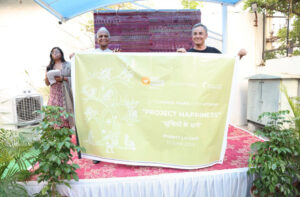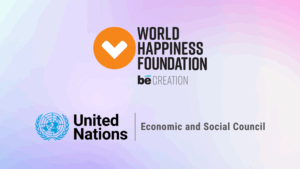
A Dream Come True: My Journey with NKC and the Team at Jaipur Rugs
As I reflect on the incredible journey I’ve had the

The world today is a complicated place. Technological advancements have allowed us to be more connected than ever, yet we have never been more disconnected from each other and our environment. We are more aware of global problems than ever, yet the physical distance from them provides a (false) sense of security and an excuse not to deal with them. However, we don’t realize that in such an interconnected, globalized world, every problem is a global one. It is 2022, yet the social justice issues we face today are more or less the same as they were a hundred+ years ago. How we deal with them will decide the future of humanity and its ability to flourish and prosper.
The connectivity we have has made our world smaller. We can travel more easily and even rally around global causes from our homes. Our voices have more value than ever before. A simple hashtag can create a global movement. It is time we finally realize the power we hold and trust in our ability to institute social change.
To say the past two years were challenging would be an understatement. We’ve dealt with the global pandemic, natural disasters, war, social justice movements, and more. The ongoing pandemic has caused a historic economic downturn with thousands of shut-down businesses and millions of unemployed people. Because of this, social justice issues such as climate change, poverty, racism, and food insecurity are now more important than ever. Here are some of the most pressing social justice issues we face today:
1. Climate change: The effects of climate change and its threat to humanity are more evident than ever before. Aside from obvious physical threats and challenges, climate change can also bring social challenges. It can put a strain on economic and natural resources and harm the well-being of all humanity. But, despite all the evidence, many still live in denial. Because of this, climate change has also become a political issue and a source of great division.
2. Healthcare: An important part of social justice is the ability to have fair access to healthcare. However, this issue remains a controversial subject worldwide. There are still big problems concerning access, coverage, and stigma, especially mental health issues.
3. Racial injustice: This is a problem as old as the world itself. Its impact can be found in practically all aspects of our daily lives. It has had long-term physical, mental, social, political, and economic consequences for various minorities that have faced (and still face) discrimination.
4. LGBTQ+: The rights of LGBTQ+ people have been a long-standing issue worldwide. The people from these groups have been experiencing harassment, discrimination, and violence for many years, and they still face it today. They are often unable to access the same economic, educational, healthcare, political, and other opportunities.
5. Refugee Crisis and Immigration: The refugee crisis still dominates our headlines, and with a reason. According to the UN, since 2019, nearly 70.8 million people have been forced to flee their homes, out of which almost 30 million have ended up in refugee camps worldwide. Refugees face numerous social challenges such as accessing healthcare, education, and economic opportunities.
Politicians have long understood the importance of storytelling for expanding their influence and building power, as well as winning short-term victories and long-term systematic change. They know that the language and stories we use play a significant part in shaping our world views and, ultimately, the policies we create and support. These stories, or narratives, about the world around us, can be the wind in our sails, propelling us forward to new frontiers of liberation and significant victories. This is one of the main goals of the World Happiness Foundation.
Over the years, we have focused the World Happiness Fest on exploring insights and experiences through a healing framework to create a fundamental change and peace. In 2021, our focus was on suffering, understanding it, and trying to develop ways we can diminish it on a global level. Life changed suddenly for the entire world when the COVID-19 pandemic arrived, and with it came struggles and suffering. We have all experienced a new reality that had a huge impact on our lives. We still experience many of the same difficulties and sorrows the pandemic left behind two years later. Because of this, in 2022, we have shifted our focus on (re)connecting with ourselves, our communities, and nature. Why?
Because during the lockdown, we could see the rebirth of nature in many places around the world. In some sense, we could say that the lockdown liberated nature. As factories closed and motorways cleared, we could see brown pollution belts shrinking over countries within days of lockdown. For many, this was the first glimpse at what the world could look like without fossil fuels. We could also witness just how much nature and green spaces have been comforting during the lockdown. Numerous surveys showed that people felt time in nature helped support their mental and physical well-being during the lockdown. The importance of going back to nature and preserving it was more evident than ever.
Once the worst was over, we understood that we must finally address things that divide us and find permanent solutions so that humanity can make new, big steps towards prosperity and flourishment. With this in mind, we decided to focus the next World Happiness Fest on building narratives to human rising. A good example of this global way of thinking and addressing social justice issues are books by two very inspiring people – Leah Thomas and Aja Barber.
Leah’s The Intersectional Environmentalist acts as the intersection between environmentalism, racism, and privilege and acknowledges the fundamental truth that we cannot save the planet without uplifting the voices of its people, especially those often unheard. It aims to educate the next generation of activists on how to create inclusive, meaningful, and sustainable change. Aja’s Consumed addresses the grave problem of over-consumerism, asking us to look at how and what we buy and how we can solve the problems created by a wasteful system.
This proactive and fundamental change is what the World Happiness Foundation wants to support and participate in. We need to appreciate and cherish each other just as much as we need to respect and care for this beautiful planet. We must build new social justice narratives that address the world’s major issues and create a new paradigm of living. Such narratives can help us go from indifference to empathy, and empathy leads to action. In my mind, this is the only way to go.
Keep reading the series. An I.D.E.A for Social Justice

As I reflect on the incredible journey I’ve had the

By Luis Miguel Gallardo, President of the World Happiness Foundation

As I sit on the banks of the Ganga in
